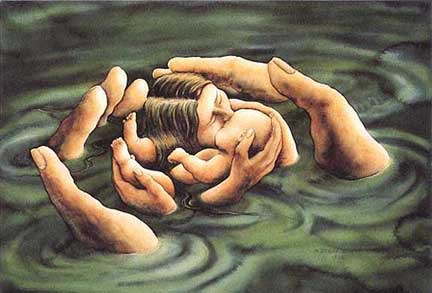The love of God is universal to all mankind. I believe it, not because it’s what I’ve been taught but because it’s true.

Scriptures are replete with him caring for and loving those who, to the average person, would appear undeserving, those who were not in a covenant relationship with him and those who didn’t even know him. This was the subject of a previous article.
But for some reason, we return to discuss this topic. The love of God. Why? Well because there’s more to it. There’s more that scripture teaches us about experiencing this love.
Let’s liken this additional exercise of discovery to a parent with several children. That parent loves them all. Not because of what the children do, but just by virtue of their being their offspring. His or her love for them is true and tangible, providing for their needs, endeavouring to keep the peace between them and direct them as best as possible. Their ultimate desire is that each child lives a fulfilled and happy life.
As the children grow, they each develop an individual approach to responding to their parents love and direction. Some listen, engage and understand. They may go on to apply the direction they are given to their lives and experiences. They may not. Some ignore or discard the direction given. They may go on to live without applying it to their lives. They may reconsider and give it a go. In all of this, their parents never stop being their parents. Their love for their children never wanes.
But make no mistake. Something happens in this multiple parent-child dynamic. Some children, by virtue of the level of their engagement with their father or mother, will have a deeper, more intense relationship with them. Some will not. Some will come to know and understand their parents more. Some will not. Some will come into a place of greater closeness to them. Some will not.
All this comes about not as a result of a special affinity for one child over another, but as a consequence of fellowship and a relationship nurtured by the mutuality of love, communion, honour and respect.
Some children, by virtue of the level of their engagement with their parents, will have a deeper, more intense relationship with them. Some will not. As this is with human family relationships, so it is with God.
As this is with human family relationships, so it is with God. Although he loves us all, there are some of us who engage with him just that bit more – or a lot more. Who have by the sheer force of constant communion, forged for themselves a deeper relationship with, or greater access to, God.
Let’s consider the man David as an example.
David was an interesting biblical character. In spite of his many flaws, he is perhaps one of the few people whom Scripture records had a rather intense personal relationship with God. When not at war or frolicking with other people’s wives, he spent quite some time in the presence of God and it was as a matter of course that he enquired at the hand of God for any major decision he was about to take.
To David, God was as real as a flesh and blood parent, whom he loved and valued dearly. It wasn’t about what he could get out of God or how he could merely appease him and move on with living his life as he pleased. God was an integral part of his life. His thoughts on God circled around doing that which pleased him, or that which he just might like.
When it so transpired that God was displeased with his decision to take another man’s wife by deceit and murder, he apologised immediately and was remorseful; looking for a way to obtain the forgiveness of the one he loved so dearly. [1]2 Samuel 12:13
When he became king, he desperately wanted the ark of the covenant near him and once it was, he did certain extraordinary things; [2]2 Samuel 6 things that even God hadn’t requested for when he established the tabernacle in the time of Moses.
It was David that established the priestly office of the choir to minister in the tabernacle and in God’s house with singing. [3]1 Chronicles 6:31-48 Before him, there was no such office in the Bible. All the Levites did previously was linked to the setting up and administering of the ark, sacrifices and the tabernacle. In his interaction with God David had learned that the spirit of the Lord responded positively to music and praise, and he decided that worship in the tabernacle need not just be about obtaining atonement but also about singing and praising God. [4]1 Chronicles 15:15-24 And so the tradition of praise and worship as an integral part of ceremonial service was born – out of David’s desire to celebrate God.
But perhaps the most obvious and more spoken of example of David’s passion for God is contained in 2 Samuel 7. Here we are privy to the musings of the now powerful and successful King David, whose kingdom was at rest. For from the time when the children of Israel had been nomads, they lived in tents. And so did their God. But now, many years later, they had become settled in homes of brick and mortar. Yet the principal place in which they worshipped God remained in a fold-able, movable, portable tent. To David that just wasn’t right. If he could manage a settled and magnificent dwelling, God deserved no less. That influenced his thinking and his desire to build God a house. It had nothing to do with what he could gain from God, but had everything to do with what he could give – an eagerness to please this God he was so in love with.
God is a God of love and he is seeking personal relationships with humanity – relationships borne of and built on love. Relationships which deepen with constant communication, irrespective of individual character flaws and imperfections.
And God responded.
In return, God was never far from David. He loved him back with an even greater amount of fervour and intensity. David offended? God sends someone to warn him and give him the opportunity to repent. David needed direction? God sends him his word. David faced condemnation because he danced to celebrate God, God gets involved and responds on David’s behalf. David expressed a desire to build God a house? God establishes an everlasting covenant of kingship with him, even though he couldn’t take this particular gift from David.
So deep and so real was their relationship that God describes David as a man after his own heart. [5]1 Samuel 13:14, Acts 13:22
Yet David was no saint. Far from it. He did things that upset God and he often strayed from the path that he had been directed to walk; the episode with Bathsheba being a clear example. He too acknowledged his imperfections in respect of the guidance God set for him as king [6]2 Samuel 23:1-5. But at no point did this erode his affection for or reduce the love and respect he had for this God. And vice versa. God continued to love him and guide him, even when rebuking him for the things he’d done wrong.
Scripture is God’s invite to mutuality of love.
David’s relationship with God didn’t absolve him of experiencing the consequences of his actions, or keep him immune from the trouble and hardship that his life brought. Instead it gave him guidance when he needed it, truth no matter how bitter and unwelcome it was, peace in the midst of many a storm and perhaps the greatest companionship any man could wish for.
This relationship, hidden in this historical account of covenants, wars, and sometimes just plain destruction called the Bible, is perhaps its kernel. That God is a God of love and he is seeking personal relationships with humanity – relationships borne of and built on love. Relationships which deepen with constant communication, irrespective of individual character flaws and imperfections.
It therefore behoves us, as children of God, to come to a place in our journey of faith where we begin to see God as one to have a continuous connection with and not just an object of worship or appeasement. He is not just an awesome powerful being that exists outside the realm of our experience or communion.
Like any human parent, God hungers for communion with his children. And that he is eagerly waiting for us to come to him, not out of duty, obligation or any other self-driven agenda, but out of our love for the one who is our parent and who desperately wants to be our friend.
If what we believe is true, that we are made in his image and likeness, then we must believe that like us, God has feelings and emotions. That like any human parent, God hungers for communion with his children. And that he is eagerly waiting for us to come to him, not out of duty, obligation or any other self-driven agenda, but out of our love for the one who is our parent and who desperately wants to be our friend.
Then and only then will we begin to experience the full gamut of God’s love. Like David, let us no longer be satisfied with just experiencing the universality of God’s love but actively forge a personal and intimate relationship with our heavenly father. So that we may come to a place where our souls pant after God like the deer desperately seeking water; [7]Psalm 42:1 and his love alone fills us up.


